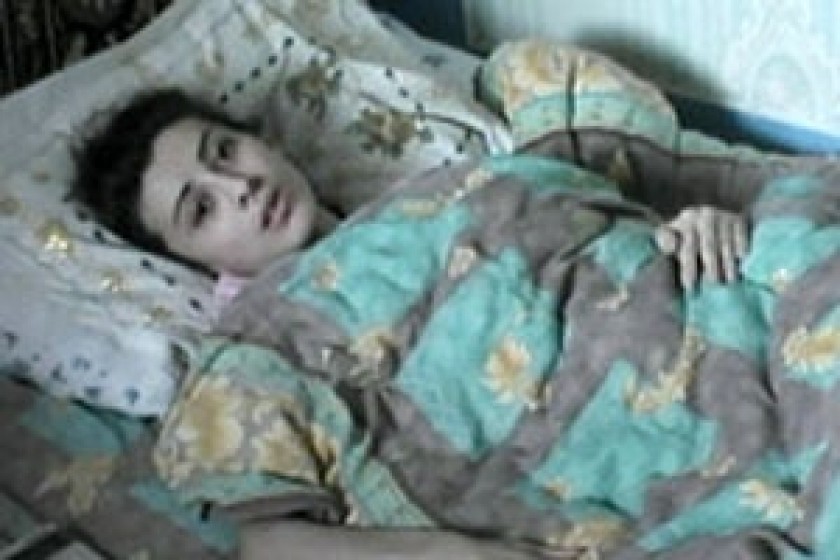
The Plea of a Disabled 26 Year-Old – “Good people, please help me”
The last school bell rung for 26yera-old Meri Asatryan didn’t usher in the beginning of a new and wonderful life; just the opposite. In her words, “it was the start of a slow road to hell”. Her dreams of going on to college and of following in her mother’s footsteps and becoming a teacher fell to pieces just one year after finishing high school.
It was while she was going to school inUkraine. One day, out of the blue and with no signs of being ill, her entire body started to hurt. At first she thought that she had caught a chill but a few days later her feet started to swell-up.
Afterwards, the swelling spread over her whole body. Meri Asatryan underwent a medical check-up and was given a few medicines to take. Initially, they seemed to help out a bit. Serious medical examinations are costly however, and the money needed just isn’t available. Later on, her relatives believed that what the girl lacked was some of that good old native mountain air so they sent her back to Kapan, in southern Armenia. Once back in Armeniaher condition only worsened and she has been confined to her bed for the past six years.
“I don’t sleep at night and the pain is tortuous. I’m thinking about getting enough money together and going to Stepanavan where they say there’s a guy who works miracles through the power of God,” Meri states. Meri, categorized as first-degree disabled, isn’t even able to sleep in a bed. She sleeps on a mattress on the floor. It is her mother’s sister that takes care of her now; the mother having left for Moscow to tend to her husband. Meri relates that her father suffered a stroke and requires constant care. The 9,500 dram pension barely pays for the pain killers Meri takes to make life mildly bearable. “Once every six months I receive a dosage of cerebrolizin (a brain protein hydrolyzate injection). One regiment, 20 vials, costs 74,000 drams. I get injected with this so that my arteries can function and my blood circulation is normal; so that my extremities don’t go numb and wither,” Meri recounts, barely able to smile through the pain, and jokes that experiencing all this has made her a doctor of sorts. She continues to talk, as if guessing what my next question will be, “Friends and neighbours, kind people, help out when they can, so that I can at least get by and live.”
“Her body is in pain. My boys help out caring for her. When it comes to natural bodily functions or washing, any place you touch on her body to take her to the bathroom causes her to cry out,” says Meri’s Aunt Lena. The doctors say it’s a case of neural inflammation, but the nerves of what organ, they cannot say. “Apparently, the problem is somehow linked somehow to my buttocks,” Meri concludes, “if only I had the money to get a real minute physical in Yerevan. At least I’d know if it is curable or will I be spending the rest of my life like this, tied to a bed.”
Relatives say that the doctors haven’t given up hope and that there is still the possibility of restoring Meri’s health. Days go by when the pain stops, even allowing Meri to get out of bed and walk down to the house yard. “One day we were all sitting in the office when the door opens and in walks Meri using her cane. We were totally in shock. Jumping for joy we hugged one another but then, two days later, she fell back in bed,” recounts Kamo Davtyan, President of the “Alive” NGO that assists the disabled. Mr. Davtyan along with other “Alive” members paid Meri a visit on December 10th, her birthday. The guest brought flowers, gifts and warm greetings but deep in Meri’s heart other hopes were being kindled. “Let’s see if luck comes my way and that I can celebrate my 27th birthday as I once used to live,” aloudly proclaimed Meri Asatryan, giving away her secretly-held desire.
All the while, government institutions and official continue to debate the issues of equal rights for those with disabilities and to insure conditions of equal accessibility for them. On December 12th a roundtable discussion took place, organized by the Syunik Regional Authority’s Committee for People with Disabilities, and with the participation of various organizations working in the field. The committee’s 2009 annual plan is pretty all-encompassing. Committees dealing with the problems faced by the disabled are to be set-up in the four districts of Syunik, access walkways are to be erected at all cultural and sporting venues in the region’s urban centers, classroom training sessions are to be conducted, etc. Let us hope that the members of the Syunik committee will not remain indifferent to the plight of this young woman and that they and other good Samaritans will come to Meri’s aid.
 Videos
Videos Photos
Photos
Write a comment